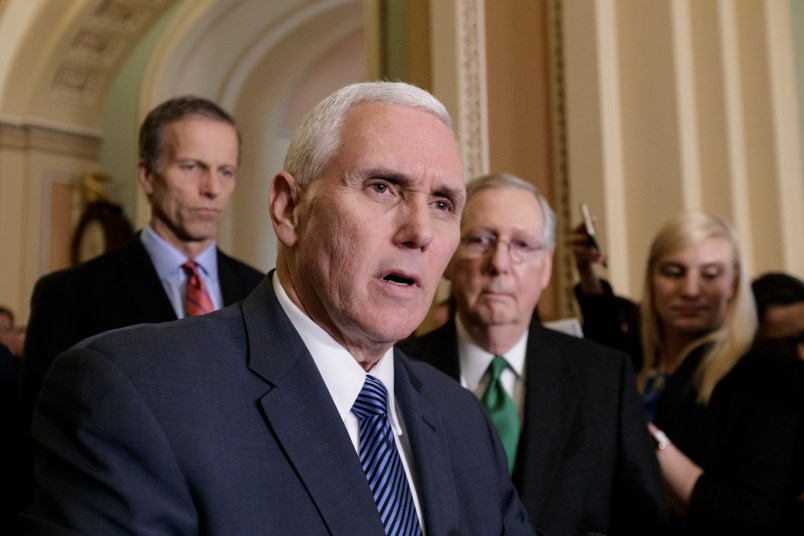As Republicans continue their relentless march to undo former President Barack Obama’s regulations—on labor rights, climate change, online privacy and more—the Senate held a contentious vote Thursday to unwind one of his last actions in office: a rule that barred states from discriminating against Planned Parenthood and other reproductive health care providers when distributing federal grants under Title X.
To overcome a 50-50 stalemate on advancing a resolution to roll back the rule, which was implemented in February, Republicans took the rare step of bringing in Vice President Mike Pence to cast a tie-breaking vote.
Senate Democrats blasted the move as “wrong and dangerous,” warning that it would encourage states to cut funding to Planned Parenthood in areas where no other women’s health clinics exist.
“They have demonstrated an unmitigated desire to cut women’s access to health care in order to win political points,” said Sen. Richard Blumenthal (D-CT) of his Republican colleagues.
The gutting of the rule protecting Planned Parenthood’s funding has already passed the House, and if it clears final passage in the Senate it will head to President Donald Trump’s desk. But health policy experts say the passage of the resolution won’t immediately strip funding away from Planned Parenthood. Though it could empower states to attempt to do so going forward, those attempts would likely be blocked by courts, experts say.
“Obama’s regulation made important clarifications about how Title X is already supposed to work—saying states cannot discriminate when handing out the funding based on the fact that an organization provides abortions,” explained Kinsey Hasstedt, the senior policy manager at the Guttmacher Institute. “So they can repeal the regulation, but the regulation just provided clarification. The grants still have to be awarded to the applicants who are best able to meet the family planning needs of their community, and often those are places like Planned Parenthood that also provide abortion services with separate dollars.”
Despite the fact that it’s already illegal for any entity to use federal funding for abortion services, conservatives argue that giving an organization that performs abortions any federal dollars will indirectly support the practice. Democrats and moderate Republicans, on the other hand, say the funding supports a range of vital health services including cancer screenings, treatment of sexual transmitted infections and birth control.
“This regulation is not about access to abortion,” Sen. Patty Murray (D-WA) said on the Senate floor. “It’s about making sure states cannot discriminate against providers who are part of a safety net that serves women who have no place else to go.”
When the rule was signed by Obama in December, a New York Times analysis found that Planned Parenthood affiliates constituted about 10 percent of all the health centers that receive Title X family-planning money, but served about one-third of all patients who depend on the program.
Hasstedt cautioned Thursday that states may interpret the Senate vote as license to move forward with bills that put extra conditions on Title X grants, steering them away from Planned Parenthood and towards, say, state hospitals that do not provide abortions. An outright ban on Planned Parenthood receiving the funds is likely to be challenged in court, where the organization can argue that such a ban violates the original intent of Title X.
But states have already begun to take subtler steps, implementing rules that prioritize funding for state-run providers and de-prioritize grants to Planned Parenthood.
“It does not mean Title X funding goes away,” Hasstedt said. “It does not mean states are suddenly allowed to discriminate against Planned Parenthood. But it is part of a broader effort and campaign to undercut the family planning safety net in this country.”
Republicans attempted to strip Planned Parenthood of all its federal funding with a provision in the American Health Care Act. When that bill failed, they vowed to keep trying.
It’s a politically precarious move. The same week that the AHCA went down in flames, pulled moments before a scheduled vote, multiple national polls were released that showed broad, bipartisan support for Planned Parenthood and widespread opposition to cutting its funding. The research firm PerryUndem found that 74 percent of voters polled opposed defunding Planned Parenthood, including 57 percent of Trump supporters. A poll by the Kaiser Family Foundation found that 75 percent of the public supported continuing federal funding for Planned Parenthood, including more than half of both Republican women and Republican men.







There is NO war on women.
Please make a note of it.
How can there be when Republicans won’t engage in war with a women without their wife present?
A post modern GOP feature…
Please, NEVER forget that Pence refers to his wife as “Mother.”
There is never ever any real policy from the GOP, anymore; just a dangerous combination of spite, magical thinking and demagoguery.